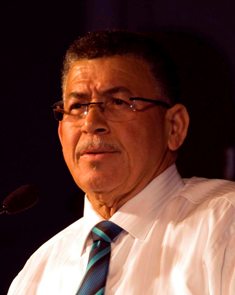Archive for September, 2010

One man arrested for nightclub murder
 (CNS): More than a year after the shooting, police have announced that a 24-year-old man has been arrested in connection to the death of Carlo Webster. The 24-year-old man, who is from the West Bay area, was arrested earlier this morning (Wednesday 22 September) on suspicion of murder, police revealed. Webster was gunned down in the Next Level Nightclub, on the West Bay Road, on 10 September in a shooting which police have said they believed was connected with a tit for tat escalation of gang violence throughout 2009. Webster was shot in the head in front of over one hundred people who were in the club that night. Police have not named the man and have not indicated if he was already in custody or not. However, a spokesperson said that enquiries into the shooting continue.
(CNS): More than a year after the shooting, police have announced that a 24-year-old man has been arrested in connection to the death of Carlo Webster. The 24-year-old man, who is from the West Bay area, was arrested earlier this morning (Wednesday 22 September) on suspicion of murder, police revealed. Webster was gunned down in the Next Level Nightclub, on the West Bay Road, on 10 September in a shooting which police have said they believed was connected with a tit for tat escalation of gang violence throughout 2009. Webster was shot in the head in front of over one hundred people who were in the club that night. Police have not named the man and have not indicated if he was already in custody or not. However, a spokesperson said that enquiries into the shooting continue.
On the night of the incident the 911 Emergency Communications Centre received a call froma member of the public reporting that a shooting had occurred inside Next Level. Police responded to the scene and found a man in his thirties inside the club who had received fatal gunshot wound. Another man was then found at the rear of the club suffering from a gun shot wound to his abdomen.

Law enforcement raid nets immigration offenders
 (CNS): Two Jamaicans and one Caymanian were arrested during a joint RCIPS and immigration operation on Monday night which involved some twenty law enforcement officers who were carrying out checks in the Eastern Avenue area of George Town. The two Jamaican nationals were arrested on suspicion of having landed illegally and the Caymanian for obstruction of the officers all three remain in custody pending further investigations. Meanwhile, another man who is a permanent resident with the right to work was arrested for not having an employment rights certificate.
(CNS): Two Jamaicans and one Caymanian were arrested during a joint RCIPS and immigration operation on Monday night which involved some twenty law enforcement officers who were carrying out checks in the Eastern Avenue area of George Town. The two Jamaican nationals were arrested on suspicion of having landed illegally and the Caymanian for obstruction of the officers all three remain in custody pending further investigations. Meanwhile, another man who is a permanent resident with the right to work was arrested for not having an employment rights certificate.

Governments turn up heat on tax cheats in Med
 (FT.com): Panic swept through Italy’s superyacht owners like wildfire last May, when finance police pounced offshore and seized the 63m Force Blue from Formula One tycoon Flavio Briatore, evicting his ex-model wife and infant son, amid accusations of tax fraud. Tax police said Briatore was suspected of evading €4m ($5m) in unpaid VAT on the boat and tax of €800,000 on fuel. Legal advisers around the world promptly told their clients – some 90 per cent of whom, like Briatore, had their yachts under the Cayman Islands flag – to reconsider before entering Italian waters. In both Italy and Greece, the Mediterranean yachting idyll is coming under threat, as cash-strapped governments turn up the heat on tax evaders.
(FT.com): Panic swept through Italy’s superyacht owners like wildfire last May, when finance police pounced offshore and seized the 63m Force Blue from Formula One tycoon Flavio Briatore, evicting his ex-model wife and infant son, amid accusations of tax fraud. Tax police said Briatore was suspected of evading €4m ($5m) in unpaid VAT on the boat and tax of €800,000 on fuel. Legal advisers around the world promptly told their clients – some 90 per cent of whom, like Briatore, had their yachts under the Cayman Islands flag – to reconsider before entering Italian waters. In both Italy and Greece, the Mediterranean yachting idyll is coming under threat, as cash-strapped governments turn up the heat on tax evaders.
Audit office defers FOI
(CNS): The Auditor General’s Office remains determined to keep a lid on the number of public bodies that have not conformed with the Public Management and Finance Law this year, and has refused a CNS freedom of information request regarding the submission of annual accounts. Despite the fact that additional public funds were allocated to help financial officers catch up with delinquent government accounts so they could submit the 2009/10 financial year on time, the audit office says it is not prepared to reveal whether that extra expenditure of public money has improved the situation. Although it is an independent office, free to make its own decisions about disclosure and the only place collating information about government financial compliance, the auditor general is giving nothing away.
Local customs officer’s drug running connection
(CNS): Unconfirmed reports that three Caymanian men have been arrested in the UK on charges of importing drugs may also include a local customs officer. Chief Customs Officer Carlon Powery (left) told News 27 yesterday that he was aware of an alleged offence regarding a flight that had left the Cayman Islands for the UK but was not prepared to comment on the connection with one of his officers. Powery said he did not want to withhold any information from the public but the investigation was in the preliminary stage. CNS understands that the men involved were on a British Airways flight and were arrested on arrival in London with a significant amount of cocaine and may have been assisted by an official at Owen Roberts International.

Lisa moves slowly as the 13th storm threatens to form
(CNS): At 8m this morning Tropical Storm Lisa was about 450 miles west-north-west of the Cape Verde Islands moving east-northeast at a slow 5mph with maximum sustained winds of 45mph. At this point Lisa poses no threat to land as forecasters say the storm is likely to take a turn toward the east and then south over the next day or two. Some slow strengthening is forecast during the next 48 hours and storm force winds currently extend outward up to 45 from the centre. Meanwhile, an area of low pressure over the south-central Caribbean Sea has been given an increased chance by the National Hurricane Centre of becoming a tropical depression later today or tomorrow as it moves westward at 15 mph toward the western Caribbean.

Mac vows 3 months to success
 (CNS): During a television address last week the country’s premier said he was putting forward “specific measures” to address the country’s declining economic fortunes. McKeeva Bush told the public that he was confident that within 90 days of the TV broadcast (16 September) Cayman would be back on the path to success. Bush listed a number of proposals that were being considered to improve the economy, and after a period of consultation he said he would deliver anotherpublic speech revealing which proposals government intended to implement. The premier did not reveal the exact details of the measures he had spoken about but said government would encourage new business to invest here.
(CNS): During a television address last week the country’s premier said he was putting forward “specific measures” to address the country’s declining economic fortunes. McKeeva Bush told the public that he was confident that within 90 days of the TV broadcast (16 September) Cayman would be back on the path to success. Bush listed a number of proposals that were being considered to improve the economy, and after a period of consultation he said he would deliver anotherpublic speech revealing which proposals government intended to implement. The premier did not reveal the exact details of the measures he had spoken about but said government would encourage new business to invest here.

Government buy-in and public participation needed
Coming from a country where FOI has been in place for over a decade provides me with a unique vantage point from which to observe how Cayman is implementing the law, coping with new responsibilities and openness and how the public is embracing (or not embracing) these new rights.
The two most prominent points that come to mind as I think about writing this article are government “buy in” and public participation, both of which are necessary for the law to work properly and be meaningful.
What do I mean by government buy in? I mean a genuine effort by those who run the show to provide support for FOI processes, respect the timelines prescribed in the law and respond as openly and completely as possible to requests no matter who has made them and no matter the perceived reasons for the request. During my time here I have seen a dedicated commitment to accomplishing the goals of the law from a large number of civil servants. In some other cases, unfortunately, I have also seen a good amount of apathy from a small group of others who hold key positions within government. It is disheartening to see this when they are the ones that should be champions of the law rather than neutral or, in some cases, negative. Now, this is not to say that Cayman is unique in these attitudes as I have experienced similar trains of thought back home. The uniqueness here, I think, is the fact that some of the negative attitudes come from some of the highest places in government and in such a small community this can have serious ramifications on the acceptance and continued use of something as potentially controversial as FOI.
The other piece of the puzzle which has to be in place for this system to work, and with which I have seen and heard some issues, is public participation. So far, I believe the trend has been that the media and a few savvy, interested members of the public have been responsible for making a large number of the requests so far. This is evidenced by the news stories coming out in the media and the appeals that have been received by the ICO. This is not necessarily the case when it comes to all the public authorities as I know that a large number of separate individuals have requested their files from the Immigration Department. For other public authorities, however, the trend that a few are responsible for the most requests seems to stand firm. While the media does have the responsibility of conducting investigative journalism and informing the public of what they find, the public should not solely rely on them to keep the government on its toes.
I know there is still a large number of people that know little or nothing about FOI. While it is true that some people will just never be interested in the topic, I get the sense that many are at times reluctant to learn about or use the FOI system in fear that they may be singled out. A fear of repercussions if they do not make their requests anonymously may in some cases be well founded. Anonymity is especially important in a community as small as the Cayman Islands and efforts should be taken not to erode this protection or an increase in public participation may never be possible. People have a right to know what their government is doing. The culture has to change so that questioning the government and the answering of those questions should be the norm rather than the exception.
Of course change does not take place overnight. In a short period of time the government has been forced to at least partially open its doors to a level of public scrutiny that it never experienced before. For some this scrutiny can come across as threatening and, in a sense, unnatural. Change will take time. While I have picked on perhaps a couple of the more negative aspects of the Cayman FOI arena it does not mean that I have not seen other very promising aspects as well, especially from some of the very hard working Information Managers whose job it is to keep the FOI system running. The cultural change will be gradual and over time, hopefully, FOI will become more mainstream. Inevitably there will be dissenters and people that will say FOI is too much work and too costly. These people’s voices will fade, believe me. I just hope the cultural change will come before any possible negative legislative changes can be made, such as the inability to make anonymous requests or an exorbitant increase in fees, which are within the government’s power to make happen.
Cory Martinson is a former appeals and policy analyst with the Information Commissioner’s Office (ICO)

Caymanian game designer hits global apps stage
 (CNS): Local games designer Garth Humphreys has made history by becoming the first Caymanian to have a game application he designed published and distributed by Apple iTunes. His game Wubble is now available in the iTunes App Store and Humphreys says he feels like he has hit the big time. The game is a simple, yet fun word challenge for all ages and it has placed Humphreys on the world stage of game applications. While Humphrey’s says he’s not expecting to be rich beyond his wildest dreams yet the satisfaction of getting his game published is a pretty good reward.
(CNS): Local games designer Garth Humphreys has made history by becoming the first Caymanian to have a game application he designed published and distributed by Apple iTunes. His game Wubble is now available in the iTunes App Store and Humphreys says he feels like he has hit the big time. The game is a simple, yet fun word challenge for all ages and it has placed Humphreys on the world stage of game applications. While Humphrey’s says he’s not expecting to be rich beyond his wildest dreams yet the satisfaction of getting his game published is a pretty good reward.

Small hedge funds head for closure say experts
 (Bloomberg): As much as 20 percent of hedge funds globally may be liquidated by the first quarter because smaller managers are starved for fees and new capital, according to Merrill Lynch & Co. Hedge fund managers overseeing less than $100 million may be the worst hit, said Justin Fredericks, New York-based head of US.capital introductions, a prime brokerage team that brings together hedge funds and potential investors. Hedge funds globally returned on average 1.65% according to Hedge Fund Research Inc., headed for the third-worst annual return since the Chicago-based company started to track data in 1990 on concern that the recovery in economic growth may falter.
(Bloomberg): As much as 20 percent of hedge funds globally may be liquidated by the first quarter because smaller managers are starved for fees and new capital, according to Merrill Lynch & Co. Hedge fund managers overseeing less than $100 million may be the worst hit, said Justin Fredericks, New York-based head of US.capital introductions, a prime brokerage team that brings together hedge funds and potential investors. Hedge funds globally returned on average 1.65% according to Hedge Fund Research Inc., headed for the third-worst annual return since the Chicago-based company started to track data in 1990 on concern that the recovery in economic growth may falter.
About 93 percent of the $9.5 billion net inflows into the industry in the second quarter went to managers overseeing $5 billion or more, said HFR.